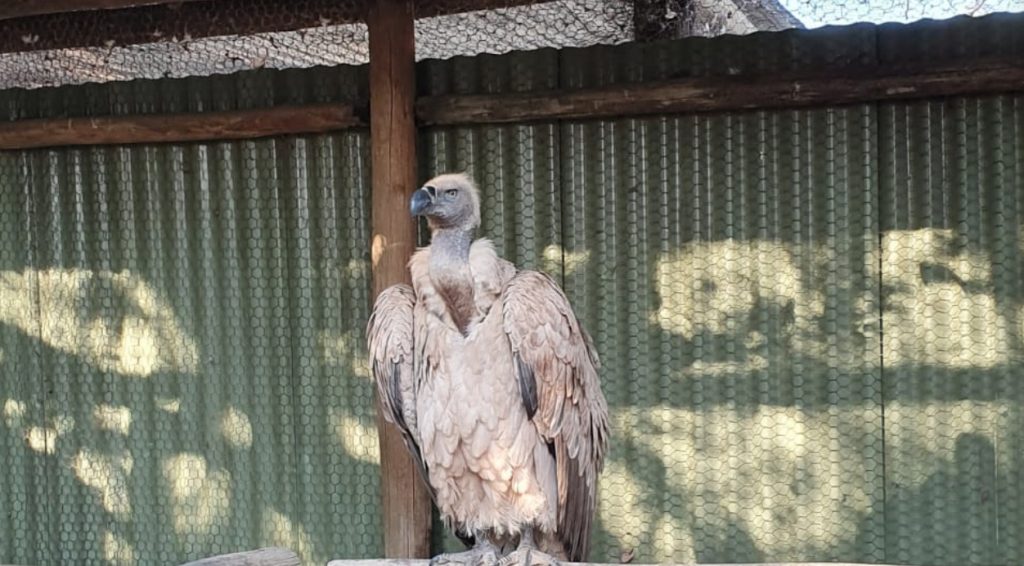
Quick action by SAFE Skilderkrans farm manager, Hilary Weyers, has helped to save the life of a Cape Vulture.
Cape Vultures are killed in their hundreds by tribal poachers in search of muti (traditional medicine) in which they believe that if you smoke or ingest certain parts of a vulture you will gain certain qualities, such as seeing into the future.
Vultures also provide a clear sign of when there has been a death in the bush as you will see large numbers of them circling in the sky above the carcass before descending to eat. This is a huge problem for poachers as it leads anti-poachers and security straight to them.
According to Brian Jones, founder of the Moholoholo Wildlife Rehabilitation Centre located close to Kruger National Park near Hoedspruit, in Limpopo, Cape vultures have become a “critically endangered” species due to excessive poaching.
Poachers ‘lace’ meat with poison – often the pesticide Temik (nicknamed two-step) that attacks the nervous system and inhibits breathing causing death within minutes. If the poisoned vulture is found in time and its stomach and crop (a thin-walled expanded portion of the alimentary tract used for the storage of food) are flushed to rid it of the poison, the birds can be saved.
According to Brian, after Hilary alerted him to the downed vulture, he was able to go and collect the vulture at the citrus farm and take him to Moholoholo for treatment.
“We immediately tubed the bird, which had lost the ability to walk due to the poisoning, with fluid and left him to rest in a dark cubicle. We continued with fluids every two hours and amazingly early the next day we found him standing.
“This was a huge relief as it meant the poison was caught early enough not to lead to permanent damage. Over the course of the next few days, he went from strength to strength and regained his appetite.”
According to Brian, the vulture was a “good weight” when he came in, which meant he had reserves to aid his recovery. After a week of being outside to build back his strength and exercise his wings, he was ringed and the information sent to Safring – the South African Ringing Scheme (SAFRING) that provides bird ringing services in South Africa and other African countries.
The vulture was then released along with a hooded vulture at the vulture “restaurant” of Moholoholo. Every afternoon the rehab puts out all their left-over meat for the wild vultures to feast on. Every day the number of each species present is recorded and any tagged individuals noted.
“He took to the sky before landing down to feast with the other wild vultures. It was truly a wonderful moment to see such a crucial yet endangered species return to the wild.”
According to Brian, the vultures often follow poachers in Kruger National Park and other wildlife sanctuaries. When the poachers kill an elephant or rhino for ivory the vultures attack the carcass. By keeping tabs on the vultures as they flock around a kill, anti-poaching units are able to track poachers – and that’s why they are poisoned.
“I am really happy that we helped to save one of these magnificent vultures,” said Hilary. “Helping to save a single bird will not make an impact on the total number poisoned, but at least with the help of Brian and staff at the Moholoholo Wildlife Rehabilitation Centre, we saved the life of one.
*The Cape Vulture is one of the largest southern African vultures. It is widespread in southern Africa, found in open grasslands and woodlands, from sea level to very high mountains provided there are high cliffs to breed on. They often feed in large groups, mostly on freshly dead animals. They are now mostly found in North West/Limpopo Provinces and Lesotho/Western KwaZulu-Natal/North-eastern Cape. Some rural tribes believe that since the Cape Vulture mostly feeds on fresh, recently dead animals they must possess an ability to know what is going to happen and by eating the brain of the bird you will gain this same foresight. They actually manage this feat through their amazingly good eyesight. The claw of the bird is also considered a good luck charm. Numbers have decreased from 100,000s to only a few 1000 left.
Since this release, Moholoholo has just received 3 more poisoned vultures from a nearby reserve! One, in particular, was in very bad shape and was not expected to make it through the night, however, 24 hours later all 3 have regained mobility and strength!

